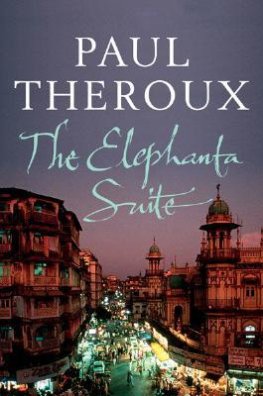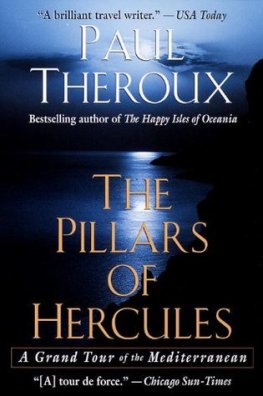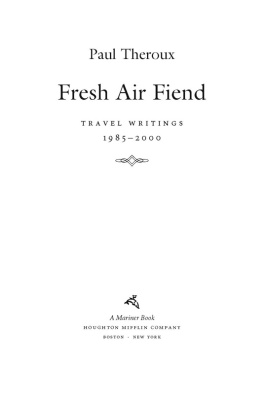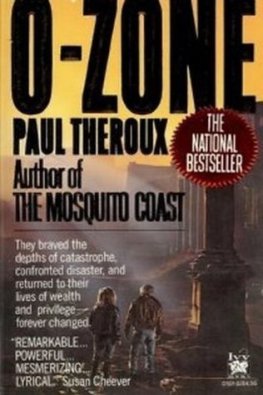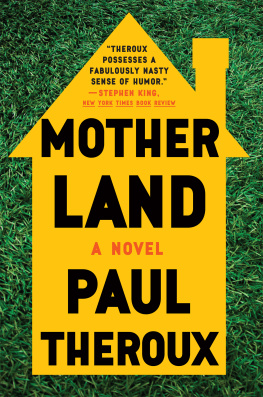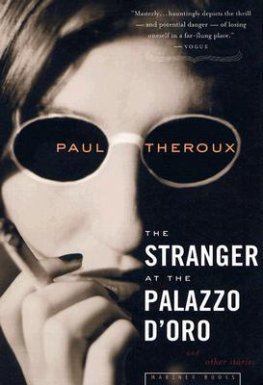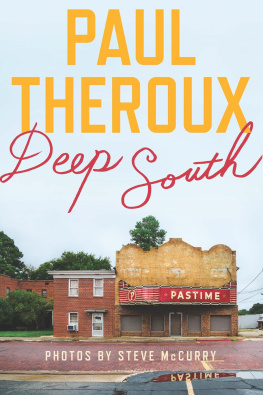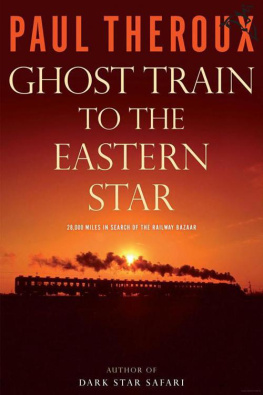Paul Theroux
The Elephanta Suite: Three Novellas
They were round-shouldered and droopy-headed like mourners, the shadowy child-sized creatures, squatting by the side of the sloping road. All facing the same way, too, as though silently venerating the muted dirty sunset beyond the holy city. Motionless at the edge of the ravine, they were miles from the city and the wide flat river that snaked into the glow, the sun going gray, smoldering in a towering heap of dust like a cloudbank. The lamps below had already come on, and in the darkness the far-off city lay like a velvety textile humped in places and picked out in squirts of gold. What were they looking at? The light dimmed, went colder, and the creatures stirred.
Theyre almost human, Audie Blunden said, and looked closer and saw their matted fur.
With a bark like a bad cough, the biggest monkey raised his curled tail, lowered his arms, and thrust forward on his knuckles. The others, skittering on smaller limbs, followed him, their tails nodding; and the distinct symmetry of the roadside disappeared under the tumbling bodies as the great troop of straggling monkeys moved along the road and up the embankment toward the stringy trees at the edge of the forest.
They scare me, Beth Blunden said, and though the nearest monkey was more than fifteen feet away she could feel the prickle of its grubby fur creeping across the bare skin of her arm.
She remembered sharply the roaring baboon in Kenya which had appeared near her cot under the thorn trees like a demon, its doggy teeth crowding its wide-open mouth. The thing had attacked the guides dog, a gentle Lab, bitten its haunch, laying it open to the bone, before being clubbed away by the maddened African. That was another of their trips.
I hate apes, Beth said.
Theyre monkeys.
Same thing.
No. Apes are more like us, Audie said, and in the darkness he covertly picked his nose. Was it the dry air?
I think its the other way around.
But Audie hadnt heard. He was peering into the thickening dusk. Incredible, he said in a whisper. I think they were watching the sunset, just lingering for the last warmth of the sun.
Like us, she said.
And Beth stared at him, not because of what hed said but the way hed said it. He sounded so pompous chewing on this simple observation. They traveled a lot, and she had noticed how travel often made this normally straightforward man pretentious.
They were at the edge of a low summit, one of the foothills of the Himalayas, above the holy city Farther up the ridge from where they were stayinga health spa called Agnion a clear day they could see snow-topped peaks. They had come to Agni for their health, planning to stay a week. The week passed quickly. They stayed another, and now they renewed their arrangement from week to week, telling themselves that theyd leave when they were ready. They were world travelers, yet theyd never seen anything like this.
Still, the file of monkeys hurried up the road with a skip-drag gait, the big bold monkey leader up front, now and then barking in his severe cough-like way.
Good evening.
A man emerged from the twilit road, stepping neatly to allow the monkeys to pass by. The Blundens were not startled. Their three weeks here had prepared them. They had not seen much of India, but they knew that whenever they had hesitated anywhere, looking puzzled or even thoughtful, an Indian had stepped forward to explain, usually an old man, a bobble-headed pedant, urgent with ir-relevancies. This one wore a white shirt, a thick vest and scarf, baggy pants, and sandals. Big horn-rimmed glasses distorted his eyes.
I see you are in process of observing our monkeys.
Like the other explainers, this one precisely summed up what theyd been doing.
Do not be perplexed, he went on.
It was truethey had been perplexed.
They are assembling each evening. They are taking last of warmth into bodies. He had the voluptuous and slightly starved way of saying bodies, giving the word flesh.
I figured so, Audie said. Thats what I said to my wifedidnt I, Beth?
They are also looking at smoke and fires at temple in town.
That was another thing theyd found. Indians like this never listened. They would deliver a monologue, usually informative but oddly without emphasis, as though it were a recitation, and did not appear to be interested in anything the Blundens had to say.
What temple? What town? the Blundens asked at once.
The Indian was pointing into the darkness. When sun is down, monkeys hasten awayseeto the trees where they will spend night hours, safe from harms way. Leopards are there. Not one or two, but abundant. Monkeys are their meat.
Meat was another delicious word, like body, which the man uttered as if tempted by it, giving it the sinewy density and desire of something forbidden. But he hadnt answered them.
Theres leopards here on Monkey Hill? Audie asked.
The old man seemed to wince in disapproval, and Audie guessed it was his saying Monkey Hillbut that was what most people called it, and it was easier to remember than its Indian name.
It is believed that Hanuman Giri is exact place where monkey god Hanuman plucked the mountain of herbals and healing plants for restoring life of Ramas brother Lakshman.
Yes, that was it, Hanuman Giri. At first they had thought he was answering their question about leopards, but what was this about herbals?
As you can find in Ramayana, the Indian said, and pointed with his skinny hand. There, do you see mountain beyond some few trees? and did not wait for a reply. Not at all. It is empty space where mountain once stood. Now it is town and temple. Eshrine, so to say.
No one mentioned any temple.
At one time was Muslim mosque, built five centuries before, Mughal era, on site of Hanuman temple. Ten years ago, trouble, people invading mosque and burning. Monkeys here are observing comings and goings, hither and thither.
I have a headache, Beth said, and thought, Inwading? Eshrine?
Many years ago, the Indian man said, as though Mrs. Blunden had not spokenWas he deaf? Was any of this interesting?I was lost in forest some three or four valleys beyond here, Bal-giri side. Time was late, afternoon in winter season, darkness coming on. I saw a troop of monkeys and they seemed to descry that I was lost. I was lightly clad, unprepared for rigors of cold night. One monkey seemed to beckon to me. He led, I followed. He was chattering, perhaps to offer reassurance. Up a precipitous cliff at top I saw correct path beneath me. I was thus saved. Hanuman saved me, and so I venerate image.
The monkey god, Beth said.
Hanuman is deity in image of monkey, as Ganesh is image of elephant, and Nag is cobra, the Indian said. And what is your country, if you please?
Were Americans, Beth said, happy at last to have been asked.
There are many wonders here, the Indian said, unimpressed by what hed just heard. You could stay here whole lifetime and still not see everything.
Were up at Agni, Audie said. The lodge. Just took a walk down here to see the sunset.
Like the monkeys.
The Indian wasnt listening. He was scowling at the valley he had described, where the mountain had been uprooted.
How old do you think I am? he asked. You will never guess.
Seventy-something.
I am in my eighty-third year. I do yoga meditation every morning for one hour. I have never tasted meat nor alcoholic beverage. Now I will go home and take little dhal and puri and curd, that is all.
Where do you live?
Just here. Hanuman Nagar.
Your village?
The old man exploded with information. Township of Hanuman Nagar is substantial, with a market and textiles weaving and sundry spheres of commercial enterprise, including iron mongeries, pot-making, clay-baking, for house tiles, kilns and enameling.

